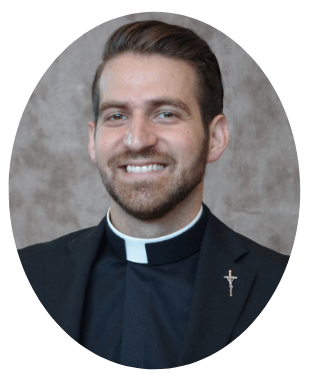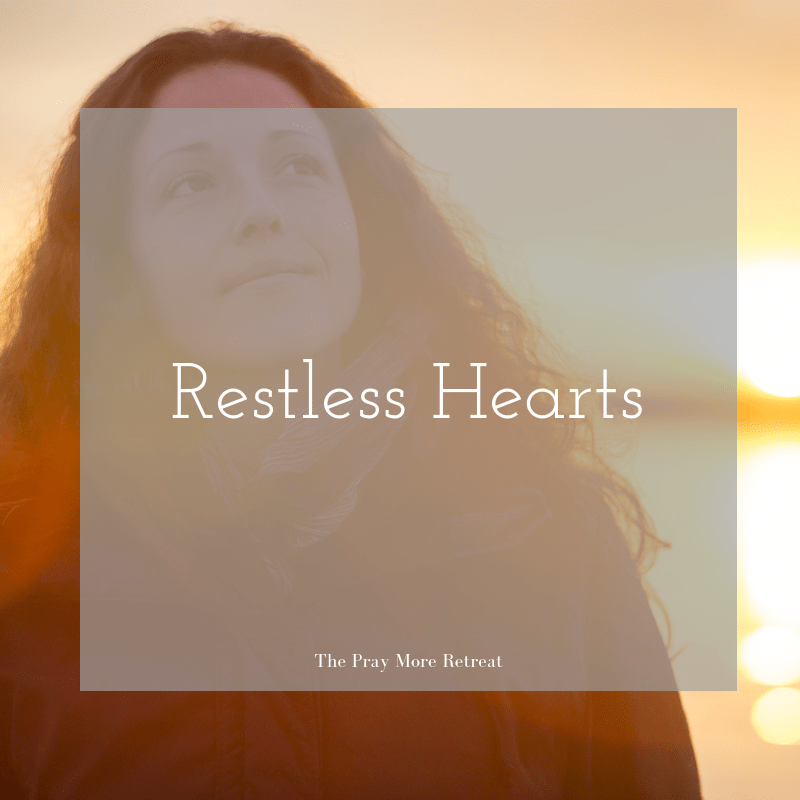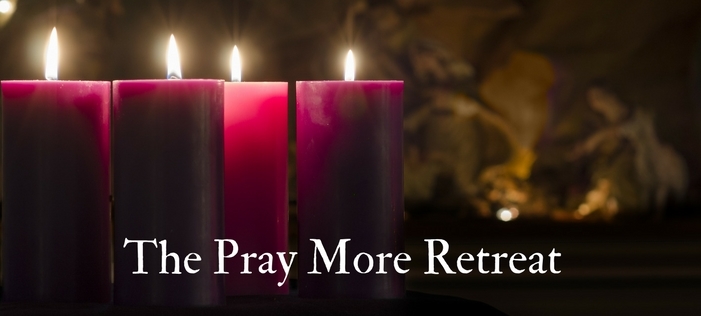Summary
Fr. Kyle Manno talks about our identity as children of God and how we can live our lives centered to that fact. He gives us two points that we can do and practice every day for a more fruitful and meaningful life towards Him.
Thank you for watching and participating in this retreat!
Not Registered, yet? Don’t miss the rest of the talks! Register for the Pray More Retreat!
Downloads
Audio MP3
Click here to download audio file.
Printable Study Guide PDF
Click here to download the printable study guide.
Printable Transcript PDF
Click here to download the transcript of the video presentation.
Reflective Study Guide Questions
“You have made us for yourself, O Lord, and our heart is restless until it rests in you.”
St. Augustine
- Our identity is something we search for for our entire lives, and it is only God who can show us our identity. How have you seen culture or society tell you more about who you are, rather than what God has been telling you?
- Manno mentions a few false identities that we can sometimes fall for: that we are ugly, that we are worthless, etc. How have you fallen for these false identities? What does God really tell you about them, and about who you are?
- The one identity that can never be stripped away from us is that we are daughters & sons of God. How do you acknowledge this, how do you accept and believe in this?
- How much energy and time throughout the day do you put into your relationship with Jesus Christ? How can you devote more of yourself to this?
Text: Restless Hearts
Alrighty, I’m excited to be with all of you as we continue through this Advent season. I’m Father Kyle Manno, priest of the Rockford Diocese in Illinois, and I’m assigned at the Newman Center right here in my office at Northern Illinois University, and a vocation director for the diocese. I’m in charge of bringing more men into the priesthood, but also helping father the men who will one day be fathers. So, gosh, isn’t it exciting that we have this new liturgical year? Right, Advent. It’s similar to a calendar year – it starts January 1 , ends December 31. Well, in our liturgical year, the church calendar, we begin with Advent, and then we journey through, right, preparing for Jesus coming, His birthday, and then journey through His entire life, death, resurrection. Beautiful stuff.
A Quote from Saint Augustine
So I’m excited to be with you, and today what I want to talk about is this beautiful quote from Saint Augustine, right. He says “Our hearts are restless, until they rest in Thee, O Lord.” Isn’t that the truth, that our hearts are made for Jesus Christ? Right. Not just made by God, but we’re made for God. And until we recognize this, we will never be fully satisfied, right. And what I want to hit on is the fact that it is only God who can show us our identity, right. And in fact our identity is something that we’re searching for our entire life.
Recognizing the Identity
Think about this: When a child is born, they can’t even speak, right. They have no voice yet. Then as they start getting older, you start teaching them very basic things. So you bring out different colors and you go “Red, green, yellow.” You get shapes and you’re like “Circle, square, star.” Then you get numbers, “One, Two, Three. A, B, C.” And eventually, you can get 2 colored blocks, and you can point to your child and say “Which block is red?” And eventually the child can look back and forth between the 2 blocks and they can point “Red.” And we all know the second that child points to the red block, everyone goes “Yay! You did it!” Right, “You recognized! You saw the truth of the identity of that block. That it’s red.”
Well, then, eventually, they keep getting older, and at some point you teach them numbers and letters. And a kid can first start speaking “A, B.” And when they start saying “A, B,” you go “Yes! You learned your first letters.” And when they point to the “A” you go “Yes! That’s A.” It’s amazing, we rejoice even at the youngest ages when someone recognizes the identity of something. And, in fact, I remember this beautiful moment when my niece Alexa, when she first discovered who she was, right, we would all stand there and we would say “Where’s Alexa?” We would say “Where’s Alexa?” And eventually she would grab her own chest and she would go “Right here I am!” And we would go “Yes, you’re Alexa!” And again, we’d all cheer, *clap* *clap* *clap* *clap* and she would cheer *clap* *clap* *clap* “I’m Alexa.”
And we cheered because she knew who she was, right. What’s the greatest moment for a parent when their child is young? It’s when they look to their parent and they say “Mommy,” or “Daddy.” What do we do? We cheer. “Yes! I’m daddy.” “Yes! I’m mommy.” And we rejoice, at the youngest age, when a child recognizes, sees the identity of an object, then sees the identity of a person – mommy, daddy, me. And so is it innate in our bodies to seek out the truth? To identify things? And then we rejoice. We discover that truth. “Who is that? Who am I?”
And this path, of recognizing who we are, gets confused. It gets most confused when we grow up, right. We go through elementary school learning things, and we get to middle school and high school, and this identity gets attacked, right. We do this thing where we start believing false identities, right. “I’m worthless. I’m broken. I’m ugly.” Because when the world starts coming in on us, it tries to destroy that goodness. And so what happens is we start experiencing one of 2 things. Either A: We attach to these false identities – “I’m worthless. I’m a cheater. I’m a sinner. I’m an adulterer.” – Or B: We attach to good identities, but ones that are fleeting.
Let me explain. We attach to “I am mother.” “I am father.” “I am a teacher.” “I am CEO,” right. And, those are good identities, they’re not bad, but are they the root of our identity? Right, let me explain. What happens when you identify as mother or father, and your children go to school? You then ask “Who am I?” What happens when you lose the job being the CEO? You then wonder “Who am I?” Right. So either A, we put in the negative identities, or B, we put in these positive ones that aren’t actually the root of who we are. Let me give you an example.
What Was It Like to Lose?
There’s this lady named Ronda Rousey. She now does WWE wresting, but she originally was a UFC fighter. Now, I don’t know a lot about UFC fighting, but I at least know this: Ronda Rousey, years ago, female fighter, and she was, like, on top of the world, right. She was, like, breaking all the records in UFC fighting, she was winning all of these competitions, breaking records of, like, defeating somebody in, like, less than, like, 10 seconds. All of these crazy things, these amazing things for her profession, of what her goals were.
And in fact, when she was winning all of these competitions, you would see her in interviews, and she’d be like “I’m the best. I’m the best of the best. This is who I am. I’m Ronda Rousey, I’m the best fighter there is, and no one can stop me.” And you would see her in these interviews, before and after a fight, just exuding confidence. “This is who I am. I was born to be a fighter. I started as a fighter at a young age. My mom taught me, and I grew up winning competition after competition after competition.” And she exuded confidence.
Well then, eventually she lost. She lost bad, so bad that she was in the hospital. And in fact she was on a talk show, and the talk show was asking her “Ronda, what was it like to finally lose. Because you were on top of the world. You were winning everything! So what was it like to lose?” And Ronda sat there in the interview and she said “You know, honestly, it was terrible.” She said “Honestly, what happened is I was in the hospital room after the fight, after losing, and I was in the middle of the hospital room, crying, laying on the ground.”
And she said “I was weeping, and I was starting to have suicidal thoughts.” And she said “I wondered ‘Why do I keep existing? Why live? Like who am I if I’m not that? If I’m not the fighter? If I’m not the winner, then who am I?’” And she said “I was suicidal. I didn’t know what to do.” She said “I thought about having a husband, and I thought about the person I loved, and one day hopefully having children,” and she said “That’s what got me off the ground, was that. That I wanted more.” But she said “I was at the edge of wanting to take everything away.”
Who am I?
You see, that’s a good question, and one that we all get to at a point, and we either get there in a depressing place – kind of like Ronda – or we get there in another place. But asking “Who am I?” Right. “If everything else is stripped away, if the places I identify myself are stripped away, who am I?” Alright, “If I listen to the lies, the ones that are straight up from the evil one – ‘I’m worthless,’ or ‘I’m ugly,’ or ‘I’m fat,’ or ‘I have no goodness,’ or ‘I’m an adulterer,’ or ‘I’m whatever, insert a lie.’” If we believe those lies, if we identify with those, then nothing good comes about.
So the question is: If we are neither our lies, these false perception, or if we are neither, at the root, even these good identifications, the question is: Who we are? What’s the one identity that can never be taken away, and the one identity that will endure forever? And what that is, is I’m a son or daughter of God. I’m a child of God. And that seems easy, that seems simple, “Yeah Father, I know I’m a daughter or son of God. I’ve heard that my entire life.” Right. But do we know how profound that is? Do we recognize how profound that is? Because the reality is that’s the only thing that’s never going away, and it’s the only thing that can truly love us.
Check Your Calendar
So what we’re called to do is to pray today. Take a moment in this day of Advent, pause and pray for at least 20 minutes and ask God “Where do I identify myself? What are the lies? And then what are even other places that might not seem bad, that are good – motherhood, fatherhood, job, those are good things. But is my truest identity my life with Christ?” And a good way to gauge this is 2 things. One is: Look at your calendar and see “How much energy do I put into my relationship with Christ? To discovery my identity as son or daughter?” Because if my primary goal is not a relationship with Jesus Christ, then everything else will fall apart. If I’m not first making my love with Jesus Christ the primary goal, then I cannot be an adequate mother, I cannot be an adequate father, I cannot be an adequate daughter or son to anyone else out there in that world. I cannot be an adequate friend. If my first identity is not rooted in Jesus Christ, then everything else falls apart.
So, first of all, get your calendar and see “How much energy do I devote to Him?” Meaning “When I’m driving, am I communicating with God? When I’m at work, am I taking time throughout my day to really think about Jesus, even through the chaos? When I’m doing things in my vocation as a mother, as a father, if I’m changing that diaper, am I thinking ‘Gosh, what a grace this is, that I get to care for a baby. That I get to help sustain life, and teach this person who they are?’ Even when I’m frustrated and I’m driving my car and someone cuts me off, or I just finished a fight with a friend, do I pause and say ‘Okay God, in this moment where I was frustrated, where are You trying to love me?’ And so how much energy do I put into my relationship with Jesus Christ?” Look at that in your calendar and in your day.
Pray
And then secondly, ask yourself: Do you pray at least 20 minutes a day? Do you pray at least 20 minutes a day, where you say “This is my prayer time. Not when I’m cooking, not when I’m cleaning, not when I’m doing other things, not when I’m driving.” Those are all good things. Pray when you’re driving, pray when you’re cooking, pray when you’re anything, right. Those are good things. But do you take 20 minutes a day where you sit in a chair and you say “This is my prayer time. This is the time that I talk to Jesus and let Him speak to me.” Because if we’re not doing that every day, then we’re going to struggle. It’s going to be difficult to hear His voice.
Think about that. How does your calendar look? And then even in the things that you’re required to do that are good – your job, your relationships – is Christ at the center of them? And then secondly: Do you pray at least 20 minutes a day? That’s the equivalent of less than one television show, right. If we look at those things: Is God in every moment of our lives? And do we pray every day? If we re-tweak that schedule in our life and in our prayer and accommodate it to solely Jesus Christ, big things will happen. I promise you, if you start doing that every day, putting Christ at the center and praying for at least 20 minutes, God will do incredible things.
And so who are you? Who is the person underneath who you truly are? Because, at the end of the day, only one person can show you who you truly are, and that’s Jesus Christ. And the only way to discover who you are is by first discovering Him. Only in relation to Christ do we see ourselves. So sit, similar to the child. They cannot learn their colors, their numbers, their letters, they cannot even learn to speak without their parent. So who’s our divine parent? The Father in heaven. Let Him teach you who you are. May the Almighty God send His blessing down upon you, and teach you the grace of Your identity as son or daughter. May the Almighty God bless you. Father, Son, Holy Spirt. Amen.
About Fr. Kyle Manno

Fr. Kyle Manno grew up in Palatine, IL with two loving parents and the youngest of four children. He went to Northern Illinois University where he studied music. During his time in college, he started taking sign language classes at the local parish with a priest. He soon discovered that priests and the faith are much more enjoyable than he ever thought. After much prayer, he decided to apply to the seminary. Upon graduating from NIU with a Music Education degree he was accepted to Mundelein Seminary where he spent two years studying philosophy and another four years studying theology. During his time in seminary he was able to study Spanish in Mexico, as well as in an El Salvadorian Orphanage with 250 kids.
He was ordained to the priesthood of Jesus Christ on June 4, 2016. Of that day he says, “I can honestly say, that was the happiest day of my life. I cannot imagine doing anything else…As a deacon, I was ordained to serve. As a priest, I was ordained to give up my life so that all of you can get to heaven.” Father Manno currently serves as Vocation Director for the Diocese of Rockford and Parochial Vicar of the Newman Center at Northern Illinois University.
Father Manno also has a street evangelization project entitled, “Priest with Mic” in which he speaks to people around the U.S. about their beliefs and thoughts. He recently also brought “Priest with a Mic” to Sirius XM radio with a 3 part series that talked on Evangelization, Happiness, and love. To find out more about Father Manno visit fathermanno.com

